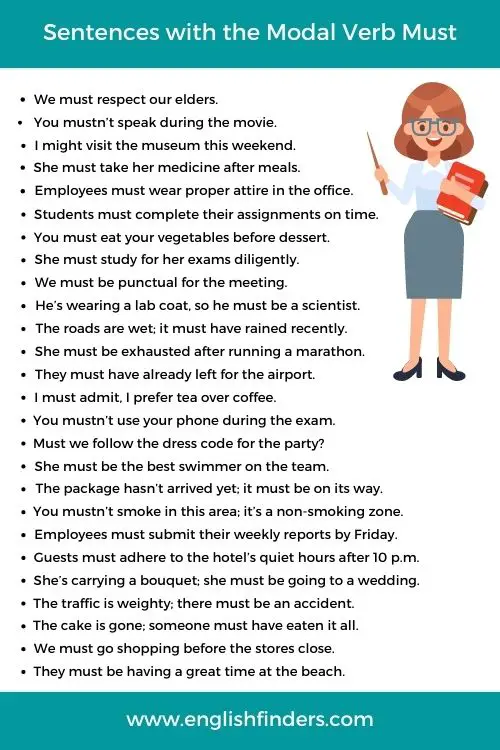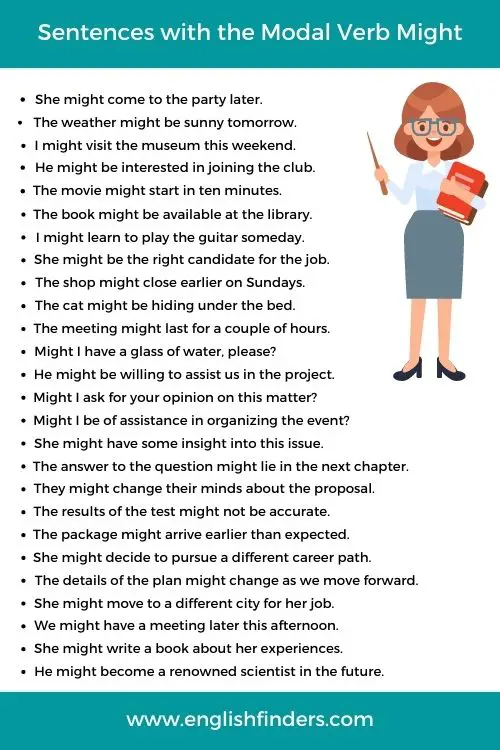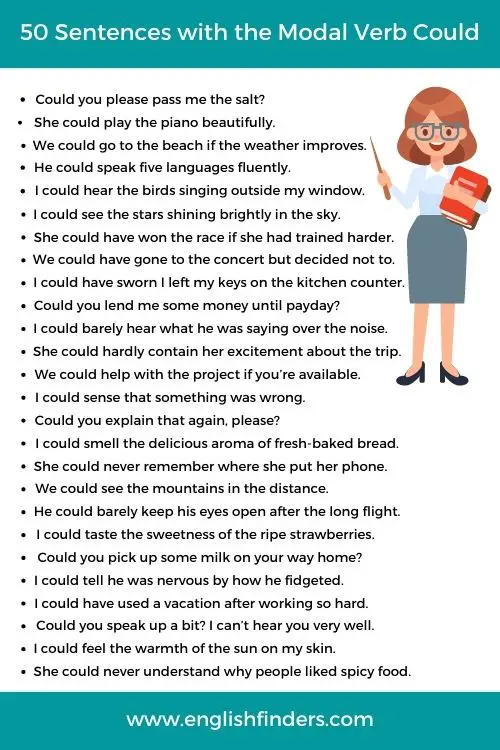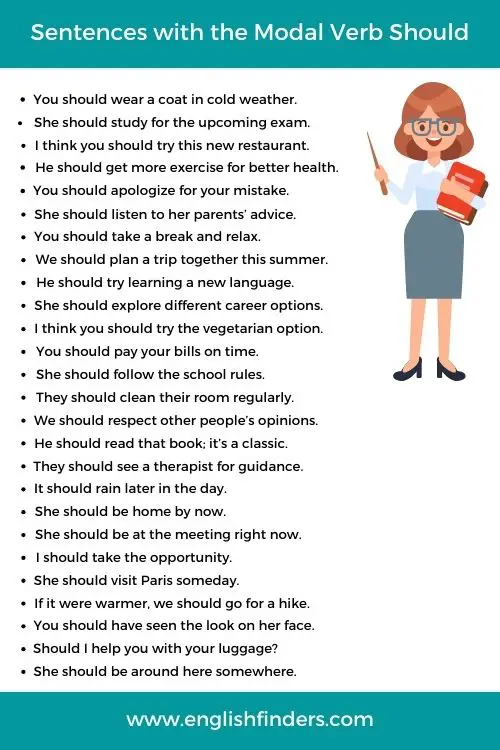Last updated on September 19th, 2023 at 06:45 am
As we know, modal verbs play a crucial role in conveying various shades of meaning and expressing necessity, obligation, possibility, and more. One such essential modal verb is “must.”
From expressing strong requirements to indicating compelling advice, “must” holds a significant place in English communication. In this article, we’ll explore 100 sentences that showcase the versatile use of the modal verb “must.”
100 Sentences with the Modal Verb Must
Quick Navigation
Let’s explore the 100 useful sentences with the modal verb must.
The Basics of “Must”
- You must eat your vegetables before dessert.
- She must study for her exams diligently.
- Must I finish this by tomorrow?
- He mustn’t forget to call his grandmother on her birthday.
- We must be punctual for the meeting.
Expressing Necessity and Obligation
- Employees must wear proper attire in the office.
- Students must complete their assignments on time.
- She must take her medicine after meals.
- You mustn’t speak during the movie.
- We must respect our elders.
Giving Strong Recommendations
- You must try the chocolate cake at that bakery – it’s amazing!
- If you’re in Paris, you must visit the Louvre Museum.
- You really must read this book; it’s a masterpiece.
- You mustn’t miss the opportunity to see the sunrise at the beach.
- For a healthy lifestyle, you must exercise regularly.
Making Deductions and Expressing Certainties
- He’s wearing a lab coat, so he must be a scientist.
- The roads are wet; it must have rained recently.
- She must be exhausted after running a marathon.
- He must be the new employee – I haven’t seen him before.
- They must have already left for the airport.
Talking about Personal Preferences
- I must admit, I prefer tea over coffee.
- She must really like cats; her room is full of cat-themed decor.
- He must enjoy cooking; his recipes are always impressive.
- They mustn’t care much about fashion – their outfits are quite casual.
- We must have similar tastes in music; I love these songs too!
Asking for and Giving Permission
- Must I ask for permission to leave the class early?
- You mustn’t use your phone during the exam.
- Must we follow the dress code for the party?
- May I go to the restroom? – Yes, you must.
- You mustn’t enter the construction zone without a hard hat.
Expressing Probability
- The flight must be delayed; the departure board shows a new time.
- She must be the best swimmer on the team.
- He’s been practicing the piano for hours and must be improving.
- The package hasn’t arrived yet; it must be on its way.
- With his dedication, he must succeed in his business venture.
Talking about Rules and Regulations
- Passengers must fasten their seatbelts during takeoff and landing.
- You mustn’t smoke in this area; it’s a non-smoking zone.
- Employees must submit their weekly reports by Friday.
- Students mustn’t cheat during exams; it’s against the school policy.
- Guests must adhere to the hotel’s quiet hours after 10 p.m.
Expressing Deductions and Conclusions
- She’s carrying a bouquet; she must be going to a wedding.
- The traffic is unusually heavy; there must be an accident.
- He must really love astronomy – he talks about stars all the time.
- They’ve been practicing late every night; they must have a big performance soon.
- The cake is gone; someone must have eaten it all.
Discussing Future Possibilities
- You must visit New York someday; it’s an incredible city.
- We must go shopping before the stores close.
- She must finish her thesis before the end of the month.
- They must be excited about their trip to the theme park.
- He mustn’t forget to buy a gift for his sister’s birthday party.
Expressing Strong Convictions
- She must be the best candidate for the job.
- They must be having a great time at the beach.
- It must be wonderful to live in a small, peaceful village.
- He must really want to win the competition; he practices tirelessly.
- She mustn’t doubt her abilities; she’s incredibly talented.
Expressing Disapproval or Unwillingness
- I must say, I don’t agree with your decision.
- They mustn’t want to participate in the event; they haven’t signed up.
- She must be unwilling to apologize, so she’s avoiding us.
- We must decline the invitation; we’re already busy that day.
- He mustn’t like spicy food; he always orders the mildest dish.
Giving Instructions
- To bake the perfect cake, you must preheat the oven.
- You mustn’t forget to double-check your work before submitting it.
- To access the content, you must click on the link.
- If you’re lost, you must ask for directions.
- To assemble the furniture, you must follow the instruction manual.
Expressing Indisputable Facts
- The sun must rise in the east and set in the west.
- Water must boil at 100 degrees Celsius.
- It must get colder in winter, and the days must get shorter.
- People must need food, water, and shelter to survive.
- Plants must require sunlight to grow.
Discussing Professional Etiquette
- In formal emails, you must use a respectful tone.
- During presentations, you must maintain eye contact with the audience.
- Employees mustn’t use personal devices during work hours.
- To excel in your career, you must continuously improve your skills.
- When networking, you must introduce yourself confidently.
Expressing Urgency
- We must leave now if we want to catch the train.
- She must call the plumber to fix the leak immediately.
- I must finish this project before the deadline.
- You mustn’t waste any time; the sale ends today.
- He must be at the airport on time for his flight.
Expressing Importance
- You must prioritize your health above everything else.
- To succeed, students must focus on their studies.
- In a relationship, you must communicate openly and honestly.
- He mustn’t underestimate the challenges of starting a business.
- We must remember to be grateful for what we have.
Offering Suggestions
- You must visit the art gallery downtown – it’s a hidden gem.
- To relax, you must take a leisurely walk in the park.
- If you’re feeling stressed, you must try deep breathing exercises.
- You mustn’t overthink it; just go with your gut feeling.
- We must consider taking a day off to recharge.
Expressing Disbelief
- He must be joking; that story sounds too incredible to be true.
- They mustn’t believe in ghosts; they laugh at the haunted house.
- She must be exaggerating; her description is too dramatic.
- The price must be a mistake; it’s too low for this quality.
- He must be kidding; no one can eat that much ice cream!
Giving Safety Instructions
- In case of a fire, you must exit the building immediately.
- During the storm, you mustn’t stand under tall trees.
- When using power tools, you must wear safety goggles.
- In the laboratory, you must follow the proper handling procedures.
- You mustn’t swim alone in deep water; always have a buddy.
Final Thoughts
“Must” is a dynamic modal verb that signifies necessity, obligation, and more. Its presence in English sentences adds depth and clarity, precisely guiding communication. By exploring the various contexts in which “must” is used, we gain a deeper appreciation for its significance in effective expression.

Azizul Hakim is the founder & CEO of englishfinders.com. He is a passionate writer, English instructor, and content creator. He has completed his graduation and post-graduation in English language and literature.




